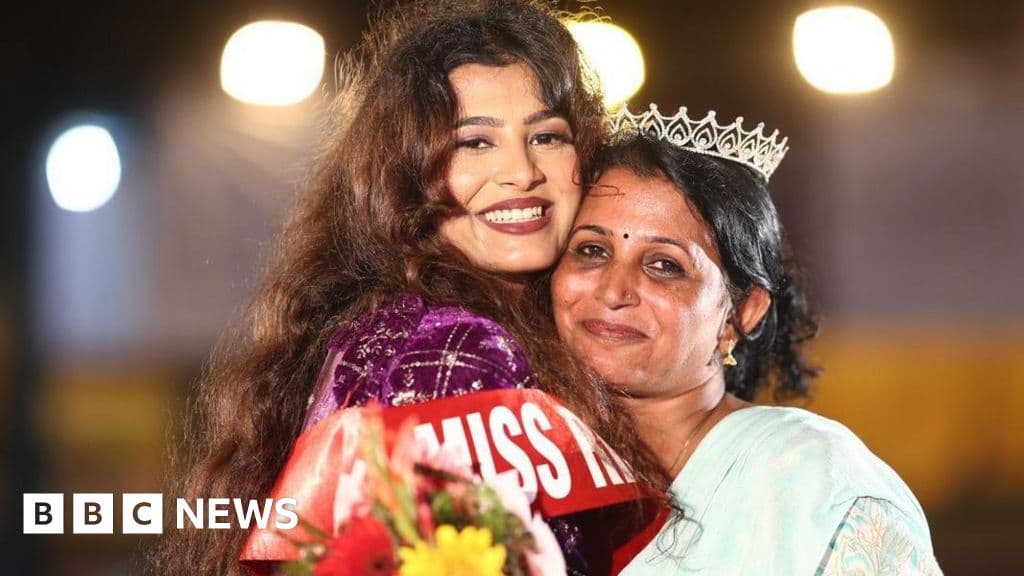We're loading the full news article for you. This includes the article content, images, author information, and related articles.
A 23-year-old Kenyan woman, Muskan Sharma, has garnered international attention after winning the Miss Rishikesh 2025 pageant in India, just a day after publicly confronting a Hindu nationalist group that objected to her attire during rehearsals.

Muskan Sharma, a 23-year-old, was crowned Miss Rishikesh 2025 last week in Uttarakhand, India, a victory that has resonated widely after a video of her spiritedly arguing with a Hindu group went viral. Sharma, who expressed feeling like "Miss Universe" after her win, dedicated her crown to her mother, highlighting the importance of self-assertion and challenging societal norms.
The incident unfolded just a day before the 4 October contest when Raghavendra Bhatnagar, the district head of the Rashtriya Hindu Shakti Sangathan, interrupted rehearsals. He objected to the skirts and Western dresses worn by Sharma and other contestants, claiming such attire was against Uttarakhand's culture.
Sharma, who had aspired to be a model since childhood, refused to back down. In the viral footage, she is heard challenging Bhatnagar, asking why he wouldn't instead shut down shops selling Western clothes if he was so concerned about culture.
The Rashtriya Hindu Shakti Sangathan, registered in January 2017, states its mission includes opposing "religious conversions" and supporting laws against "love jihad." This incident is part of a broader trend in Uttarakhand, where Hindu groups have reportedly increased their activities in recent years, targeting various aspects of public life, including women's attire.
While Rishikesh is known for its acceptance of diverse attire among tourists, the rise of such moral policing incidents reflects a growing rigidity from these groups.
The Indian Constitution guarantees freedom of expression, personal liberty, equality, and dignity for all citizens. Legal precedents, such as the Supreme Court's stance against violent protests at the Miss World gala in Bengaluru in 1996, affirm that moral policing, unless there is a clear legal violation, infringes upon individual rights.
Muskan Sharma's defiance has been widely praised. She stated, "I did what I've seen Miss India and Miss Universe winners do—take a stand for yourself and others." Another contestant, who also confronted Bhatnagar, emphasised that "clothes cannot be tied to a woman's honour," questioning who appointed these men as custodians of women's dignity.
Organisers of the Miss Rishikesh pageant, part of the Lions Diwali Mela for five years, stated they had never faced such objections before. They clarified that the event aims to empower young women and would not hurt cultural sentiments, noting that the final event featured ethnic and Indian outfits.
The increasing instances of moral policing by Hindu groups pose a risk to individual freedoms and cultural diversity in regions like Uttarakhand. Such actions can stifle aspirations, particularly among young women in smaller towns who see local pageants as a stepping stone to larger platforms.
While the incident has brought attention to the issue of moral policing, the long-term impact on cultural expression and women's rights in Rishikesh and similar regions remains to be seen. The extent to which such groups will continue to operate without significant legal challenge is also an ongoing concern.
The confrontation occurred on Thursday, 3 October 2025, during rehearsals for the Miss Rishikesh pageant. The pageant proceeded as planned on Friday, 4 October 2025, with Muskan Sharma being crowned the winner.
Muskan Sharma plans to compete in Miss Uttarakhand and potentially Miss India, aiming to use her platform to advocate for women's empowerment and self-expression. Observers will be watching for further developments regarding the activities of groups like the Rashtriya Hindu Shakti Sangathan and the response from local authorities and civil society.
Keep the conversation in one place—threads here stay linked to the story and in the forums.
Sign in to start a discussion
Start a conversation about this story and keep it linked here.
Other hot threads
E-sports and Gaming Community in Kenya
Active 9 months ago
The Role of Technology in Modern Agriculture (AgriTech)
Active 9 months ago
Popular Recreational Activities Across Counties
Active 9 months ago
Investing in Youth Sports Development Programs
Active 9 months ago